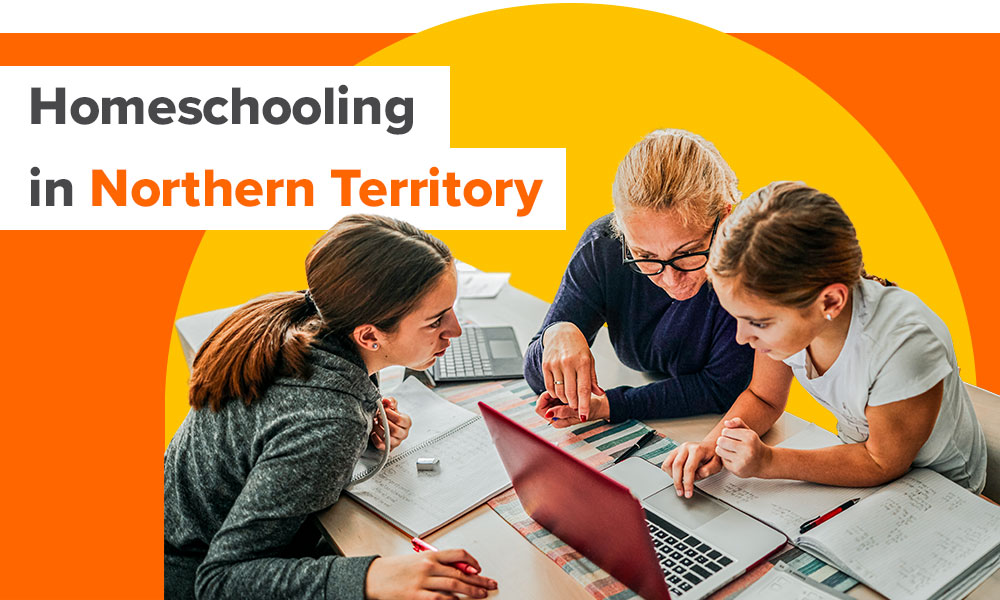According to the Education Act (2015), you can register to teach your child at home as an alternative to attending school. Applications can be submitted to the NT Department of Education (DET) and approval must be obtained before you remove your child from school or begin homeschooling.
As a home educator, you are responsible for developing and implementing a quality education program for the period of registration.

Registering for homeschooling in Nothern Territory
You will need to submit a registration form to the DET with key information about your child, including their age and year level, special needs and reasons for home education. You will also be required to submit the following documents to support your application:
- A certified copy of your child’s birth certificate
- Proof that the child resides in the Northern Territory
- Any extant court orders
- A school attendance record (if applicable)
- A home education learning plan .
An application form can be downloaded here. You can email your completed form to homeeducation.doe@nt.gov.au.
Following submission, an authorised representative of the DET will be in contact to go over your relevant documentation and organise a home visit to assess your eligibility based on sufficient resources and a suitable learning environment.
Creating a home education learning plan
An individual learning plan must be developed for each child you intend to homeschool. This program includes:
- Your proposed curriculum for homeschooling (see below).
- Your proposed program of work in each learning area, including the resources which will support your teaching.
- A summary of your teaching timetable, including the average period of time that your child will be ‘schooled’ each day.
- The number of days on which you intend to teach your child./li>
- A description of the learning space in which you intend to conduct homeschooling..
- A plan for recording learning activities, and how your child's educational progress and achievement will be measured.
- The name of the person who will be teaching your child, and their relationship to them.
The curriculum you choose or develop needs to be based on one of the learning methods approved by the Australian Curriculum Assessment and Reporting Authority (ACARA). This list includes:
- Australian National Curriculum
- International Baccalaureate Primary Years Program and Middle Years Program
- Australian Steiner Curriculum<
- Montessori National Curriculum Framework
Whichever style or method you choose, the following eight areas have been specified as mandatory by the Education Act (2015):
- English
- Mathematics
- Sciences
- Humanities and Social Sciences
- The Arts
- Languages
- Health and Physical Education
- Technologies
A home education learn plan template can be found here.
How Cluey supports homeschooling in Nothern Territory
Our flexible, online model means that your child can log in to our online learning platform from anywhere, utilising video, audio and collaborative whiteboard capabilities.
You can choose the areas you'd most like to focus on and specify your learning goals. Our programs can be tailored to your teaching philosophy and the needs of your child. What's more, you'll receive a report at the end of every session which can form part of your evidence of learning progress.
Learn more about homeschooling support with Cluey >>
FAQs
What do I need to consider before I homeschool?
Although you will eventually need to select or develop a home education plan, homeschooling is first and foremost an incredible time commitment. It’s important to consider whether you have the patience, dedication and energy required to teach your child, and whether this will get in the way of paid work or other commitments.
How old must my child be before I register them?
In the Northern Territory, a child must be enrolled at school or registered for homeschooling by their sixth birthday
What happens after I register?
According to the NT Department of Education, you will be notified in writing once your application has been received. The curriculum team will then review your application and home learning plan and complete an assessment report. A student check will be done and a home visit will then be arranged to discuss the proposed learning plan, recommendations that have been made in the curriculum assessment report and any concerns raised by the student check.
Once a decision has been reached, you will be notified in writing regarding your registration.
How long will the application process take?
Although every approval process is different depending on your individual circumstances, an average approval process from the time you submit your application is between one and three months.
What happens when a project officer makes a home visit?
An authorised representative of the Department of Education will get in touch within two weeks of receiving your application and will likely want to schedule an appointment shortly thereafter. Be prepared to discuss your reasons for homeschooling and demonstrate a sound understanding of the outcomes of your chosen syllabus, as well as your home learning plan.
This is an informal discussion in which your DET rep will ensure you have a healthy learning environment and sound homeschooling plan.
What happens if my application for registration is refused?
To appeal an unsuccessful registration or a cancellation of a home education approval, you must request an appeal in writing within 30 days of being notified. Appeals can be sent to homeeducation.doe@nt.gov.au
How can I make sure I get approved?
Your application will be assessed based on your ability to provide a quality education for your child, and to document the educational opportunities you’re offering to your child. This includes identifying ways in which your program fosters your child’s unique emotional, physical, social and intellectual needs.
You should also be ready to book a home visit within 1-2 weeks of submitting your application. The DET cites inability to make contact with applicants as a key reason for refusal.
What are the essential subjects/curriculum I need to teach?
The curriculum you choose or develop needs to be based on one of the learning methods approved by the Australian Curriculum Assessment and Reporting Authority (ACARA). Eight areas of study have also been specified as mandatory by the Education Act (2015):
- English
- Mathematics
- Sciences
- Humanities and Social Sciences
- The Arts
- Languages
- Health and Physical Education
- Technologies
How much time should I spend on each subject?
You might find that a four day week works best, or five half days. You need to ensure you cover the requirements outlined by the DET, but the way you teach it and the time you spend on each module is entirely up to you.
What if my child has special needs?
If you have a child who for any reason doesn’t fit the “ordinary” box, homeschooling could be a positive option. Homeschooling can often take the stress out of structured lessons, allowing children to learn at their own pace and in their own way. For special needs, always seek as much support as possible, both to ensure you’re teaching to your child’s unique needs, and to connect with other parents or teachers who might be experiencing similar challenges.
How do I plan my homeschool/learning program?
Begin with the learning outcomes specified by the DET and customise a program based on these. There are also several out-of-the-box homeschooling programs, many of which are developed by education experts and based on different approaches and teaching philosophies. Just ensure that these programs meet the unique needs and aptitudes of your child, as well as your state requirements.
And of course Cluey offers homeschooling support programs.
How do I document my homeschooling progress/portfolio?
There’s no one way to document your child’s progress at home. You might put together a collection of work, which would look different depending on the age and ability of your child. A written diary or essay samples are one example. Maths worksheets, stories based on historical understanding and other creative, inquiry-based studies are other options.
Can my child split their time between home education and school?
Part time school enrolment and part time home education is only available to senior secondary students enrolled in subjects with the NT School of Distance Education.
To be enrolled as a part-time student you must meet the following criteria:
- Be studying in years 10, 11 or 12
- Have completed a minimum of two years approved home education directly before your application to enrol
- Have a teaching and learning program plan that details the distance education school subject/s to be studied and a current Home Education Approval Notice.
Do I need formal teaching qualifications to homeschool?
You don’t need any formal training to become a homeschool teacher. As long as you meet the requirements and show evidence of learning, you’re set!
You can also employ a teacher to develop and deliver all or part of your teaching and learning plan. Your teacher must be registered with the Teacher Registration Board of the NT and have a Working with Children Check (Ochre Card) Clearance.
What do I do if I'm overwhelmed?
Will you be able to cope with the mammoth undertaking that is homeschooling? The short answer is yes, when there's a will there's a way. But it's important to understand the realities of homeschooling and seek support in the form of outside tutoring if you feel yourself burning out.
Does my homeschooled child really need to complete Year 11 or 12?
Like mainstream education, progressing to a senior level is entirely up to you and your child. If your child has university in his or her sights, you will need to enrol them in a government or independent school so that they may become eligible for a Year 12 certificate and ATAR.
You could also consider senior studies through Open Universities, which offers a Year 12 equivalent certification or tertiary study options.





